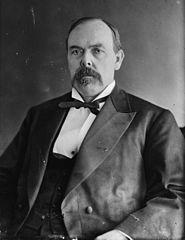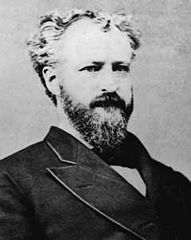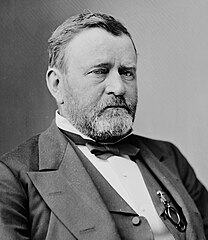
A | B | C | D | E | F | G | H | CH | I | J | K | L | M | N | O | P | Q | R | S | T | U | V | W | X | Y | Z | 0 | 1 | 2 | 3 | 4 | 5 | 6 | 7 | 8 | 9
| |||||||||||||||||||||||||||||
369 members of the Electoral College 185 electoral votes needed to win | |||||||||||||||||||||||||||||
|---|---|---|---|---|---|---|---|---|---|---|---|---|---|---|---|---|---|---|---|---|---|---|---|---|---|---|---|---|---|
| Turnout | 82.6%[1] | ||||||||||||||||||||||||||||
| |||||||||||||||||||||||||||||
 Presidential election results map. Red denotes states won by Hayes/Wheeler, blue denotes those won by Tilden/Hendricks. Numbers indicate the number of electoral votes allotted to each state. | |||||||||||||||||||||||||||||
| |||||||||||||||||||||||||||||
The 1876 United States presidential election was the 23rd quadrennial presidential election, held on Tuesday, November 7, 1876. Incumbent Republican president Ulysses S. Grant declined to run for a third term, so the party chose Rutherford B. Hayes, the governor of Ohio, as its nominee. The Democratic Party nominated New York governor Samuel J. Tilden as their nominee. It was one of the most contentious presidential elections in American history. Its resolution involved negotiations between the Republicans and Democrats, resulting in the Compromise of 1877, and on March 2, 1877, the counting of electoral votes by the House and Senate occurred, confirming Hayes as president. It was the second of five U.S. presidential elections in which the winner did not win a plurality of the national popular vote. This is the first time it happened since 1824. Following President Grant's decision to retire after his second term, U.S. Representative James G. Blaine emerged as the frontrunner for the Republican nomination. However, Blaine was unable to win a majority at the 1876 Republican National Convention, which settled on Governor Hayes of Ohio as a compromise candidate. The 1876 Democratic National Convention nominated Governor Tilden of New York on the second ballot.
The results of the election remain among the most disputed ever. Although it is not disputed that Tilden beat Hayes in the popular vote, there were wide allegations of electoral fraud, election violence, and disfranchisement of (predominantly Republican) black voters. After a first count of votes, Tilden won 184 electoral votes to Hayes's 165 with 20 votes from Florida, Louisiana, South Carolina, and Oregon unresolved. To address the resulting constitutional crisis, Congress established the Electoral Commission, a majority of which were Republicans, which awarded all twenty votes (and thus the presidency) to Hayes. Some Democratic representatives filibustered the commission's decision, hoping to prevent Hayes's inauguration, but their filibuster was ultimately ended by party leader Samuel J. Randall. The question of who should have been awarded those electoral votes is the source of the continued controversy.
To date, it remains the election that yielded the highest voter turnout of the eligible voting-age population in American history, at 82.6%.[2][3] Tilden's 50.9% is the largest share of the popular vote received by a candidate who was not elected to the presidency. Tilden was also the last person to win a majority of the popular vote until William McKinley in 1896. As of 2024[update], this marks the only presidential election in which both candidates were sitting governors. This is also the only presidential election where the winning candidate won the exact number of electoral votes needed to win at the time. (185)
Nominations
Republican Party nomination
| 1876 Republican Party ticket | |||||||||||||||||||||||||||||
| Rutherford B. Hayes | William A. Wheeler | ||||||||||||||||||||||||||||
|---|---|---|---|---|---|---|---|---|---|---|---|---|---|---|---|---|---|---|---|---|---|---|---|---|---|---|---|---|---|
| for President | for Vice President | ||||||||||||||||||||||||||||
 |
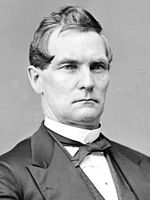 | ||||||||||||||||||||||||||||
| 29th & 32nd Governor of Ohio (1868–1872 & 1876–1877) |
U.S. Representative for New York's 19th (1861–1863 & 1869–1877) | ||||||||||||||||||||||||||||
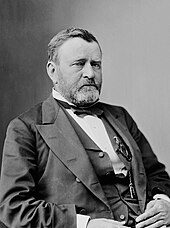
-
Senator Oliver P. Morton from Indiana
-
Senator Roscoe Conkling from New York

It was widely assumed during the year 1875 that incumbent President Ulysses S. Grant would run for a third term as president despite the poor economic conditions, the numerous political scandals that had developed since he assumed office in 1869, and despite a longstanding tradition set by George Washington not to stay in office for more than two terms. Grant's inner circle advised him to go for a third term and he almost did so, but on December 15, 1875, the House, by a sweeping 233–18 vote, passed a resolution declaring that the two-term tradition was to prevent a dictatorship.[6] Later that year, Grant ruled himself out of running in 1876. He instead tried to persuade Secretary of State Hamilton Fish to run for the presidency, but the 67-year-old Fish declined since he believed himself too old for that role. Grant nonetheless sent a letter to the convention imploring them to nominate Fish, but the letter was misplaced and never read to the convention. Fish later confirmed that he would have declined the presidential nomination even if it had been offered to him.
When the Sixth Republican National Convention assembled in Cincinnati, Ohio, on June 14, 1876, James G. Blaine appeared to be the presidential nominee. On the first ballot, Blaine was just 100 votes short of a majority. His vote began to slide after the second ballot, however, as many Republicans feared that Blaine could not win the general election. Anti-Blaine delegates could not agree on a candidate until his total rose to 41% on the sixth ballot. Leaders of the reform Republicans met privately and considered alternatives. They chose the reforming Ohio Governor Rutherford B. Hayes, who had been gradually building support during the convention until he finished second on the sixth ballot. On the seventh ballot, Hayes was nominated for president with 384 votes, compared to 351 for Blaine and 21 for Benjamin Bristow. New York Representative William A. Wheeler was nominated for vice president by a much larger margin (366–89) over his chief rival, Frederick Theodore Frelinghuysen, who later served as a member of the Electoral Commission, which awarded the election to Hayes.





